牛津小学英语六年级英语语法知识.doc
(完整版)上海牛津小学英语语法知识总结

上海牛津小学英语语法知识总结一般现在时1、定义:表示经常发生或习惯性的动作、状态。
句中通常有usually,often,every day,sometimes,always,at weekends,on Sundays等表示经常性时间的短语。
2、构成:1)当谓语是be动词时,一般现在时的构成:主语+be动词+其他如:I am a student. He is Jim’s father.They are from Japan.2)当谓语是行为动词时,一般现在时的构成:①主语(非第三人称单数)+动词原形+其他如:I often watch TV at the weekends.Mr Green and Mrs Green like collecting stamps.②主语(第三人称单数)+动词的第三人称单数形式+其他如:Jim usually visits his grandparents on Sundays.She sometimes goes to the park with her mother.3、动词三单形式的变化规则:•一般情况下,直接加s 如:read-reads,swim-swims•以s,x,sh,ch,o结尾,加es 如:wash-washes,watch-watches,do-does•以辅音字母+y结尾,变y为i,再加es 如:study-studies,fly-flies•不规则变化如:have-has4、一般现在时的句型转换:肯定句否定句一般疑问句及回答They watch TV every day. They don’t watch TVevery day.—Do they watch TV every day?—Yes, they do. / No, they don’t.She watches TV every day. She doesn’t watchTV every day.—Does she watch TV every day?—Yes, she does. / No, she doesn’t.现在进行时1、定义:表示现在或现阶段正在进行或发生的动作。
牛津译林版六年级上册英语全册语法知识点详解(unit1)
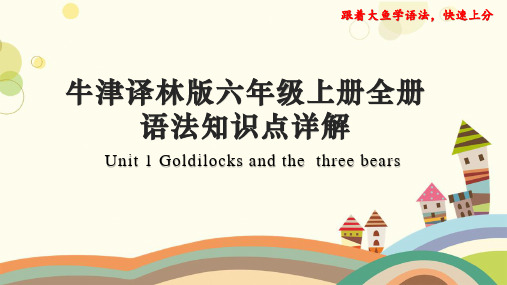
一、一般过去时的用法
(三)过去式变形规则 3. 其他动词。 (4)以“辅元辅”结尾的动词,双写这个辅音字母再加ed。如: stop→stopped、drop→dropped (5)不规则变化。如: go→went、see→saw、bring→brought、catch→caught、 sleep→slept、make→made、p)标志词 6. once(曾经);once upon a time(从前) eg: Once upon a time, the king liked new clothes. 7. last+一段时间(night/week/month/ year等) eg: We went shopping last Saturday. 8. ago(two days ago);long long ago eg: We had a picnic a week ago. 9. One day eg: One day, he got lost in the forest. 10.in +2020年以前的年份。 eg: Lily lived in Beijing in 2016.
二、现在进行时的用法
(四)注意事项 1. 根据主语单复数选用合适的be动词: 单数用is,复数用are 2. 动词ing的规则需牢记: (1)一般在动词后加ing。如:work→working、read→reading (2)以不发音的e结尾的动词,去掉e,再加ing。如:smile→smiling、write→writing。 (3)以重读闭音节结尾的且词尾只有一个辅音字母的,双写这个辅音字母加ing。常见的有: sit→sitting、stop→stopping、run→running、swim→swimming、shop →shopping。
【牛津小学英语六年级】第一单元词汇语法解析
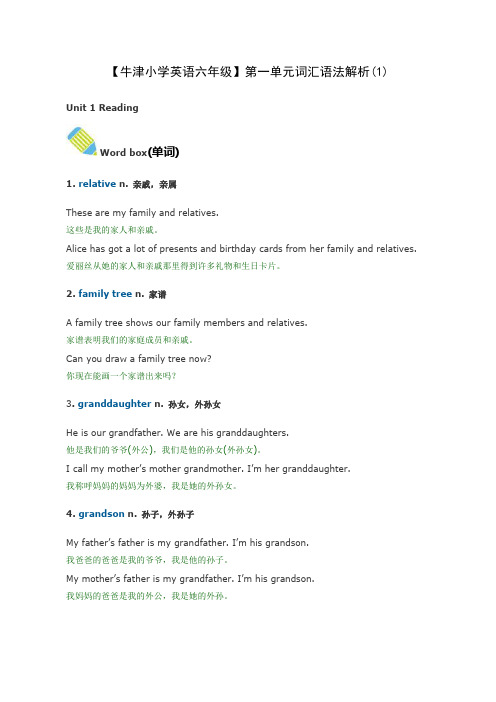
【牛津小学英语六年级】第一单元词汇语法解析(1)Unit 1 ReadingWord box(单词)1. relative n. 亲戚,亲属These are my family and relatives.这些是我的家人和亲戚。
Alice has got a lot of presents and birthday cards from her family and relatives. 爱丽丝从她的家人和亲戚那里得到许多礼物和生日卡片。
2. family tree n. 家谱A family tree shows our family members and relatives.家谱表明我们的家庭成员和亲戚。
Can you draw a family tree now?你现在能画一个家谱出来吗?3. granddaughter n. 孙女,外孙女He is our grandfather. We are his granddaughters.他是我们的爷爷(外公),我们是他的孙女(外孙女)。
I call my mother’s mother grandmother. I’m her granddaughter.我称呼妈妈的妈妈为外婆,我是她的外孙女。
4. grandson n. 孙子,外孙子My father’s father is my grandfather. I’m his grandson.我爸爸的爸爸是我的爷爷,我是他的孙子。
My mother’s father is my grandfather. I’m his grandson.我妈妈的爸爸是我的外公,我是她的外孙。
5. only adv. 仅仅I only have one aunt.我只有一个阿姨。
I only go swimming with my cousin.我只和我的表弟一起去游泳。
6. member n. 成员,会员How many members are there in your family?你家有几口人?Make a birthday card for one of your family members or relatives.为你的一位家庭成员或亲戚制作一张生日卡片。
牛津上海版英语六年级上册Unit6知识点及语法点
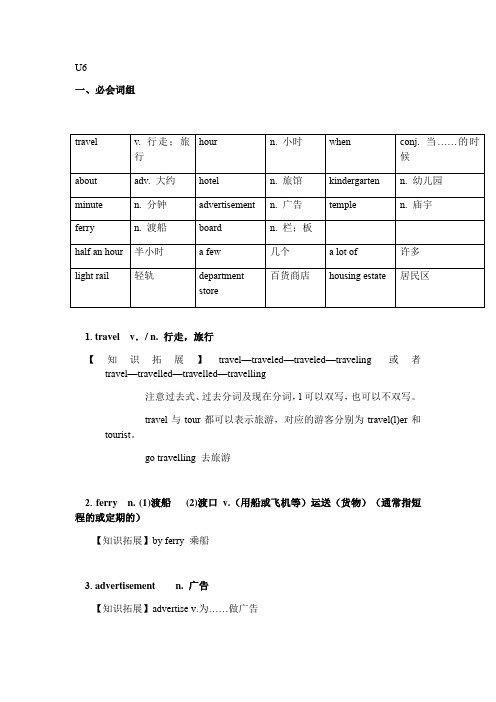
U6一、必会词组1. travel v./ n. 行走,旅行【知识拓展】travel—traveled—traveled—traveling或者travel—travelled—travelled—travelling注意过去式、过去分词及现在分词,l可以双写,也可以不双写。
travel与tour都可以表示旅游,对应的游客分别为travel(l)er和tourist。
go travelling 去旅游2. ferry n. (1)渡船(2)渡口v.(用船或飞机等)运送(货物)(通常指短程的或定期的)【知识拓展】by ferry 乘船3. advertisement n. 广告【知识拓展】advertise v.为……做广告4. board n. 栏;板【知识拓展】abroad adv. 在国外,到国外。
broad adj. 宽广的。
形象记忆board这个单词:首尾bd两个字母想象成船头和船尾,中间oar是一个单词,意思是“桨”,所以board有“甲板,上船”的意思。
5. a few 几个。
a few只能修饰可数名词复数形式,与之对应的是a little, 只能修饰不可数名词。
练习:I.Read and complete the sentences.(根据给出的首字母,完成句子。
)1. I have been to Jing’an T .It's in the centre of Shanghai.2. My father’s office is far away from home. He goes to work by l r every morning because it is fast.3. Mum likes going to some department s at weekends.4. We live in a new h e . It's large and beautiful.keys: 1.Temple 2.1ight rail 3.stores 4.housing estate 【乘坐交通方式表达】乘坐交通工具的表达:by bus/by car/by underground/by bike/by plane/by ferry /on foot乘公共汽车/乘小汽车/乘地铁/骑自行车/乘飞机/乘轮渡/步行。
小学牛津英语六年级上册第三单元知识点

小学牛津英语六年级上册第三单元知识点小学牛津英语六年级上册第三单元知识点单词:1.was(am,is的过去式)2.excited激动的,兴奋的3.monent片刻瞬间4.ago以前5.were(are的过去式)6.glasses眼镜7.camera照相机8.CDWalkman光盘随声听9.roll,卷状物10.film胶卷11.ground地面12.exciting令人激动的,令人兴奋的13.earphone耳14.diary日记,日记簿15.remember记住,记得16.weren’t=werenot17.mobilephone手机,手提电话18.race比赛词组:1.SportsDay体育运动日2.allthestudents所有的学生3.watcharunningrace观看赛跑4.veryexcited非常的兴奋5.lookfor寻找6.veryexciting非常的令人兴奋7.amomentago一会儿前8.letmesee让我看看9.justnow刚才10.ontheground在地上11.pickthemup把它们捡起来12.can’tfind找不到13.wanttoknow想知道14.behindthedoor在门后面15.apairofglasses一副眼镜16.arolloffilm一卷胶卷17.besidethecopybooksonyourdesk在你桌子上的抄写本旁18.trytoremember试着记住句型:1.Where’smydiary?It’sonthedesk.Itisn’ttherenow.Itwasth ereamomentago.我的'日记在哪里?它在课桌上。
它现在不在那里了。
一会儿前它还在的。
2.Whereareyourglasses?They’rebesidemypencilcase.Theyar en’ttherenow.Thereweretherejustnow,你的眼镜在哪里?它在我的笔袋旁。
牛津译林版六年级英语上册第六单元unit6 知识汇总
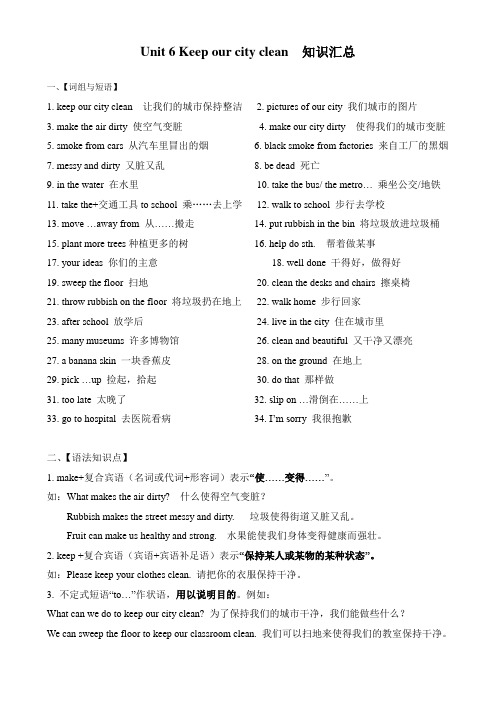
Unit 6 Keep our city clean 知识汇总一、【词组与短语】1. keep our city clean 让我们的城市保持整洁2. pictures of our city 我们城市的图片3. make the air dirty 使空气变脏4. make our city dirty 使得我们的城市变脏5. smoke from cars 从汽车里冒出的烟6. black smoke from factories 来自工厂的黑烟7. messy and dirty 又脏又乱8. be dead 死亡9. in the water 在水里10. take the bus/ the metro…乘坐公交/地铁11. take the+交通工具to school 乘……去上学12. walk to school 步行去学校13. move …away from 从……搬走14. put rubbish in the bin 将垃圾放进垃圾桶15. plant more trees种植更多的树16. help do sth. 帮着做某事17. your ideas 你们的主意18. well done 干得好,做得好19. sweep the floor 扫地20. clean the desks and chairs 擦桌椅21. throw rubbish on the floor 将垃圾扔在地上22. walk home 步行回家23. after school 放学后24. live in the city 住在城市里25. many museums 许多博物馆26. clean and beautiful 又干净又漂亮27. a banana skin 一块香蕉皮28. on the ground 在地上29. pick …up 捡起,拾起30. do that 那样做31. too late 太晚了32. slip on …滑倒在……上33. go to hospital 去医院看病34. I’m sorry 我很抱歉二、【语法知识点】1. make+复合宾语(名词或代词+形容词)表示“使……变得……”。
牛津上海版英语六年级上册Unit4知识点及语法点

一、必会词汇1、secretary n. 秘书e.g. Alice is a secretary in a small company. 爱丽丝是一家小公司的秘书。
[复数形式] secretaries[词性转换] secretary n. 秘书secret n. 秘密[对应练习]The (secretary ) are workingLinda usually helps her boss type letters. She is a .A.workerB. businesswomanC. secretaryD. bank clerk2、bank n. 银行banker n. 银行家bank robbery 银行抢劫案bank clerk 银行职员3、policewoman n. 女警察e.g. –What’s your mother’s job? 你妈妈是干什么的?-She is a policewoman. 她是一名女警察。
the police 指全体警察[复数形式] policewomen[反义词] policeman 男警察[对应练习]Look at those ladies! They are (policewoman)(policeman) help make our city a safe place.4、dentist n. 牙医to see a doctor看牙医5、postman n. 邮递员[复数形式] postmen[词性转换] post n. 邮件;岗位[对应练习]I would like to be a (post) in the future.Teddy's brother brings letter. He is a _________A.policemanB. firemanC. postmanD. milkman6、person n. 人e.g. He is just the person we need for the job. 他正是我们需要的做那种工作的人。
牛津英语六年级上册知识点
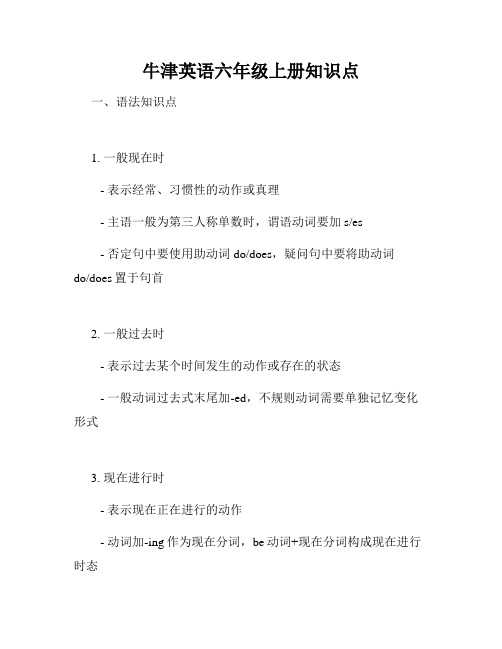
牛津英语六年级上册知识点一、语法知识点1. 一般现在时- 表示经常、习惯性的动作或真理- 主语一般为第三人称单数时,谓语动词要加s/es- 否定句中要使用助动词do/does,疑问句中要将助动词do/does置于句首2. 一般过去时- 表示过去某个时间发生的动作或存在的状态- 一般动词过去式末尾加-ed,不规则动词需要单独记忆变化形式3. 现在进行时- 表示现在正在进行的动作- 动词加-ing作为现在分词,be动词+现在分词构成现在进行时态4. 现在完成时- 表示过去某个时间发生的动作对现在造成的影响或仍然持续的动作- have/has + 过去分词构成现在完成时态5. 情态动词- 表示可能性、能力、允许性、建议性等- can/could、may/might、must、shall/should、will/would等情态动词6. 名词复数- 大部分名词加s构成复数形式,以s、x、ch、sh结尾的名词加es- 以辅音字母+y结尾的名词,改y为i,再加es- 不规则变化的名词需记忆其复数形式7. 形容词比较级和最高级- 比较级表示两者之间的比较,最高级表示三者或三者以上的比较- 一般在形容词后加er或est构成比较级和最高级,也有部分不规则变化的形容词需要记忆二、交际用语知识点1. 问路和表达方向- Excuse me, could you tell me the way to...?- Is it far from here?- Can you show me on the map?2. 表达喜好和爱好- What do you like doing in your free time?- I enjoy playing basketball and reading books.3. 表达允许和禁止- Can I go to the library?- You must not talk loudly in the classroom.4. 邀请和回应邀请- Would you like to join us for dinner?- I'd love to, thank you.5. 表达能力和请求帮助- Can you swim?- Could you please help me carry this bag?6. 表示感叹和称赞- What a beautiful painting!- You are very talented.三、单词拼写知识点1. 数字- 1: one 2: two 3: three 4: four 5: five - 6: six 7: seven 8: eight 9: nine 10: ten2. 季节- spring summer autumn winter3. 表示颜色的单词- red blue green yellow orange purple black white4. 表示家庭成员的单词- father mother brother sister grandfather grandmother5. 表示动物的单词- cat dog elephant lion tiger monkey panda giraffe四、阅读与写作1. 阅读理解- 通读全文,找出关键信息- 注意上下文逻辑和语篇连贯- 选出正确的答案或总结文章主旨2. 日记或文章写作- 关注文章结构,包括开头、中间段落和结尾- 注意用词准确,避免语法错误- 可以通过描述人物、地点、感受等来丰富文章内容以上是牛津英语六年级上册的部分知识点,掌握了这些知识,相信你在学习英语时会更加得心应手。
- 1、下载文档前请自行甄别文档内容的完整性,平台不提供额外的编辑、内容补充、找答案等附加服务。
- 2、"仅部分预览"的文档,不可在线预览部分如存在完整性等问题,可反馈申请退款(可完整预览的文档不适用该条件!)。
- 3、如文档侵犯您的权益,请联系客服反馈,我们会尽快为您处理(人工客服工作时间:9:00-18:30)。
语法知识3A - 6B Grammar1.人称代词主格:I we you she he it they宾格:me us you her him it them形容词性物主代词:my our your her his its their名词性物主代词:mine ours yours hers his its theirs2.形容词和副词的比较级(1) 一般在形容词或副词后+erolder taller longer stronger, etc(2) 多音节词前+moremore interesting, etc.(3) 双写最后一个字母,再+erbigger fatter, etc.(4) 把y变i,再+erheavier, earlier(5) 不规则变化:well-better, much/many-more, etc.3.可数词的复数形式Most nouns + s a book –booksNouns ending in a consonant +y - y+ ies a story—storiesNouns ending in s, sh, ch or x + es a glass—glasses a watch-watches Nouns ending in o +s or +es a piano—pianos a mango—mangoes Nouns ending in f or fe - f or fe +ves a knife –knives a shelf-shelves 4.不可数名词(单复数形式不变)bread, rice, water ,juice etc.5. 缩略形式I’m = I am you’re = you are she’s = she is he’s = he isit’s = it is who’s =who is can’t =can not isn’t=is not etc6. a/ana book, a peachan egg an hour7. Preposition:on, in ,in front of, between, next to, near, beside, at, behind.表示时间:at six o’clock, at Christmas, at break faston Monday on 15th July On National Dayin the evening in December in winter8. 基数词和序数词one – first two-second twenty-twentieth9. Some /anyI have some toys in my bedroom.Do you have any brothers or sisters?10. be 动词(1) Basic form: am/are/is(2) 肯定和否定句I am(not) from London.My eyes are(not) small.My hair is(not) long.(3)一般疑问句:Am I a Chniese? Yes, you are. No, you aren’t.Are they American? Yes, they are. No, they aren’t.Is the cat fat? Yes, it is. No, it isn’t.11. there be 结构肯定句:There is a …There are …一般疑问句:Is there …? Yes, there is./ No, there isn’t.Are there…? Yes, there are. /No, there aren’t.否定句:There isn’t …. There aren’t….12. 祈使句Sit down please. Don’t sit down, please.13. 现在进行时.通常用“now”.形式:be + verb +ingeg: I am(not) doing my homework.You/We/They are(not) reading.He/She/It is(not) eating.动词—ing 的形式Most verbs +ing walk—walkingVerbs ending in e -e + ing come—comingShort verbs ending in a vowel + a consonant run –running swim—swimming 14 一般现在时。
通常用“usually, often, every day, sometimes”。
形式:肯定句:I go to school on foot every day.She goes to school on foot every day.一般疑问句:Do you jump high? Yes, I do. / No, I don’t.Does he jump high? Yes, he does. / No, he doesn’t.否定句:We don’t go to school on Sundays.My mother doesn’t like watching TV in the evening.15. (情态)动词can,must, should 后面直接用动词原形。
eg: 1. I / He / She / They can sing.2.You should keep quiet in the library.16. 一般过去时态(a)be 动词的过去式:I/He/she/it was(not)…. You/we/they were….一般疑问句was, were 放在句首。
(b)动词过去式:肯定句:I watched cartoons.She visited the zoo.一般疑问句:Did you read book last night? Yes, I did. No, I didn’t.Did she clean the desk just now? Yes, she did. No, she didn’t.否定句:They didn’t go the the part yesterda y.He didn’t make model ships last week.(3)动词过去式的变化:规则动词的变化:Most verbs +ed eg. planted,watered,climbed。
Verbs ending in e +d eg liked。
Verbs ending in a consonant +y --y +ied eg : study—studiedShort verbs ending in a vowel + a consonant eg: stop --stopped不规则动词的变化:is/am—was,are—were,do—did,have/has—had,make—made,fly-flew/u: eat—ate,take—took,run—ran,sing—sang,drink—drank 等等17. “Wh-” questions.What are you doing?What colour is it?What time is it? What’s the time?Which is your watch, the yellow one or the white one?Who’s the man with a big nose?Whose bag is it?When is your birthday?Where is my ball pen?Why do you like summer?How many books are there in the school bag?How old is the young man?How much is the toy bear?How do you go to school everyday?一般现在时用法专练一、用括号内动词的适当形式填空。
1. He often (have) dinner at home.2. Daniel and Tommy (be) in Class One.3. We (not watch) TV on Monday.4. Nick (not go) to the zoo on Sunday.5. they (like) the World Cup?6. What they often (do) on Saturdays?7. your parents (read) newspapers every day?8. The girl (teach) us English on Sundays.9. She and I (take) a walk together every evening.10. There (be) some water in the bottle.11. Mike (like) cooking.12. They (have) the same hobby.13. My aunt (look) after her baby carefully.14. You always (do) your homework well.15. I (be) ill. I’m staying in bed.16. She (go) to school from Monday to Friday.17. Liu Tao (do) not like PE.18. The child often (watch) TV in the evening.19. Su Hai and Su Yang (have) eight lessons this term.20. -What day (be) it today?-It’s Saturday.二、按照要求改写句子1. Daniel watches TV every evening.(改为否定句)2. I do my homework every day.(改为一般疑问句,作否定回答)3. She likes milk.(改为一般疑问句,作肯定回答)4. Amy likes playing computer games.(改为一般疑问句,作否定回答)5. We go to school every morning.(改为否定句)6. He speaks English very well.(改为否定句)7. I like taking photos in the park.(对划线部分提问)8. John comes from Canada.(对划线部分提问)9. She is always a good student.(改为一般疑问句,作否定回答)10. Simon and Daniel like going skating.(改为否定句)三、翻译1.他在第三小学上学。
